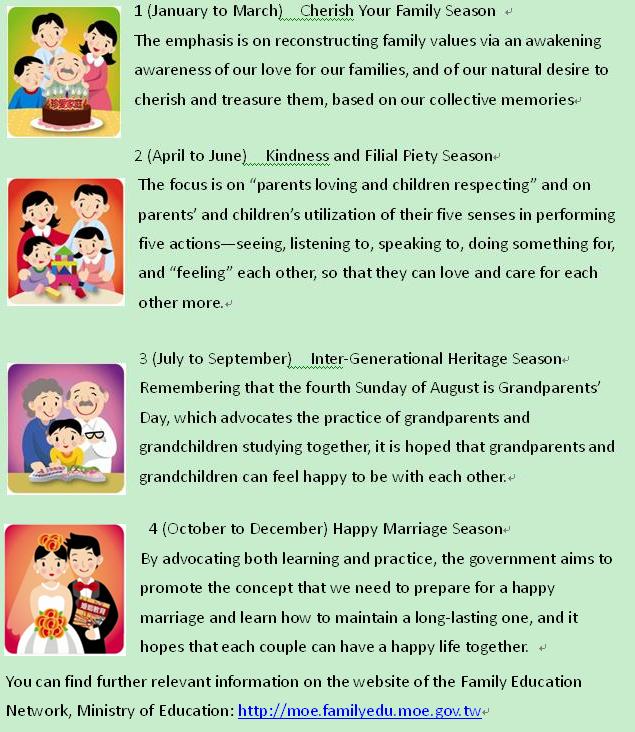2013 is Family Education Year

Given that the family is the foundation of society, the government needs to take measures to respond to the issues facing families nowadays, and to lessen the impact of the above-mentioned factors. Therefore, the government has designated 2013 as Family Education Year, aiming to awaken the public to the significance of family values. To advocate family education it has established an innovative plan, and will implement this plan through the four seasons of the year with a different focus for each season. Eventually, the government hopes that everyone can learn to value and cherish his or her family, and love his or her family members more.
Through cooperation between the different professions, the Family Education Plan will provide educational resources which can help family members learn how to cherish each other, get together more often, love each other more, and prevent family problems from arising. The government hopes that through this plan everyone can enjoy a happy family life based on family members’ cohesion and sharing, the love between parents and children who care for one another, the warmth and feeling of respect between grandparents and grandchildren, the sense of intimacy and gratitude between husband and wife, and of solicitude and support between siblings.
1 (January to March) Cherish Your Family Season
The emphasis is on reconstructing family values via an awakening awareness of our love for our families, and of our natural desire to cherish and treasure them, based on our collective memories
2 (April to June) Kindness and Filial Piety Season
The focus is on “parents loving and children respecting” and on parents’ and children’s utilization of their five senses in performing five actions—seeing, listening to, speaking to, doing something for, and “feeling” each other, so that they can love and care for each other more.
3 (July to September) Inter-Generational Heritage Season
Remembering that the fourth Sunday of August is Grandparents’ Day, which advocates the practice of grandparents and grandchildren studying together, it is hoped that grandparents and grandchildren can feel happy to be with each other.
4 (October to December) Happy Marriage Season
By advocating both learning and practice, the government aims to promote the concept that we need to prepare for a happy marriage and learn how to maintain a long-lasting one, and it hopes that each couple can have a happy life together.
You can find further relevant information on the website of the Family Education Network, Ministry of Education: http://moe.familyedu.moe.gov.tw